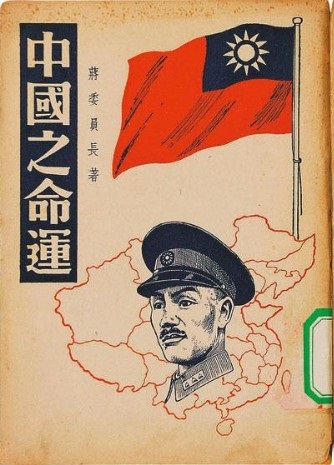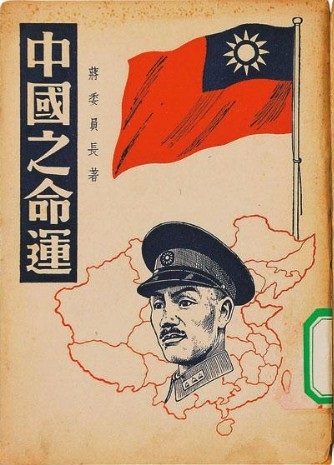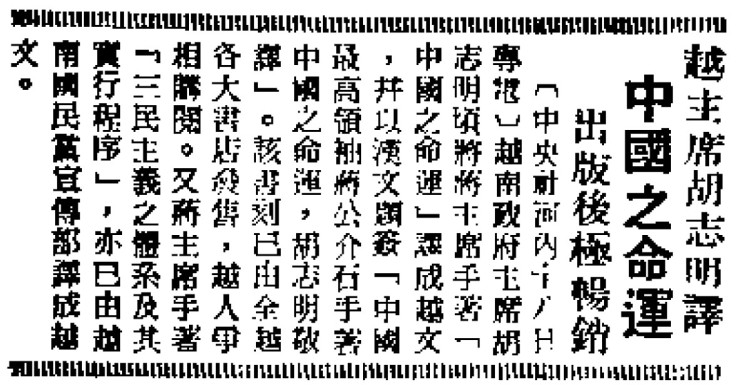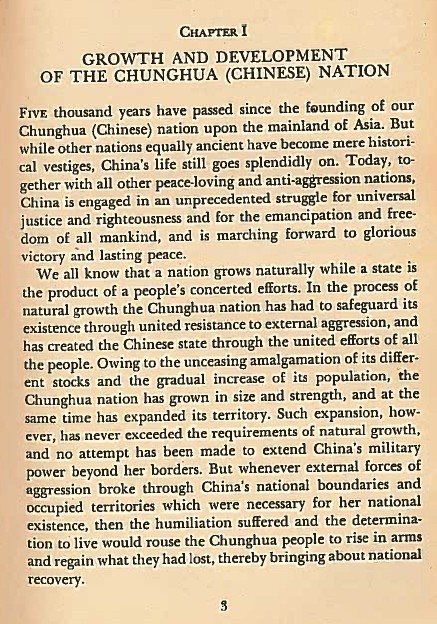Bản dịch thực hiện năm 1943. Và sau đó, tựa như được xuất bản năm 1946.
Mấy mẩu tư liệu.
1. Bảo tảng Hồ Chí Minh
"
Thời gian: - 5 - 1943
Sự kiện: Hồ Chí Minh đọc sách báo và thỉnh thoảng gửi về Việt Nam những tờ báo trong đó Người lồng một vài tin tức.
Nội dung sự kiện:
Tháng 5 đến tháng 8, Hồ Chí Minh chưa được tự do nhưng không còn phải chịu đói và bị ngược đãi nữa. Người được phép đọc sách báo và thỉnh thoảng gửi về Việt Nam những tờ báo trong đó Người lồng một vài tin tức. Đối với người Trung Quốc, Người có vẻ một học giả cao tuổi, lễ độ và trầm lặng. Người dịch cuốn Tam dân chủ nghĩa của Tôn Dật Tiên và Trung Quốc đích mệnh vận (Vận mệnh của Trung Quốc) của Tưởng Giới Thạch ra tiếng Việt.
Nguồn trích:
- Trần Dân Tiên: Hồ Chí Minh truyện. Bản dịch tiếng Hán của Trương Niệm Thức, Bát Nguyệt xuất bản xã, Thượng Hải, tháng 6-1949.
- King C. Chen: Vietnam and China 1938-1954, Princeton University, Press Princeton, New York, 1969, p. 60.
- Hồ Chí Minh-Biên niên tiểu sử, Nxb.Chính trị quốc gia, 2006, t. 2, tr. 194
Từ khóa:
Số lượt đọc:936 - Cập nhật lần cuối: 06/08/2010 05:06:59
"http://www.baotanghochiminh.vn/TabId/495/ArticleId/1389/PreTabId/465/Default.aspx
2. Bài viết của Liam
"

I was reading a newspaper from Republican China today called the Central Daily (Zhongyang ribao 中央日報). On 19 May 1946 it published a brief article entitled “Việt Chairman Hồ Chí Minh Translates China’s Destiny; Since Publication it has been Selling Extremely Well.”
(越主席胡志明譯中國之命運,出版後極暢銷)

China’s Destiny (Zhongguo zhi mingyun 中國之命運) is a book that was written by Chiang Kai-shek (and his ghostwriter Tao Xisheng) in 1943. It is a nationalist, and anti-imperialist examination of Chinese history that examines the development of the Chinese (Zhonghua 中華) nation, and then moves on to talk about the “national humiliation” that foreign imperialists brought to China, and then concludes with a discussion of how under the Guomindang’s leadership the country has been freed from the “unequal treaties” that were imposed on it, and is forging a new future.
According to the article in the Central Daily, a Vietnamese-language version of this text was being sold in bookstores across the country in 1946, and that this translation was attributed to Hồ Chí Minh.
That version had a kind of “signature” printed in Chinese that said “China’s Destiny, Written by the Hand of China’s Greatest Ruler, Mr. Chiang Kai-shek, and Respectfully Translated by Hồ Chí Minh.”
(中國最高領袖蔣公介石手著中國之命運,胡志明敬譯)

I highly doubt that Hồ Chí Minh had the time then to translate this text into Vietnamese, and therefore, I suspect that someone else probably translated the work, but perhaps Hồ Chí Minh’s name was attributed to it for diplomatic reasons, that is, in an effort to seek to establish strong relations with Nationalist China.
That said, some of the content of this text clearly must have appealed to Hồ Chí Minh and other members of the Việt Minh. Take this sentence from the first page, for instance:
“In the process of natural growth the Zhonghua [i.e., Chinese] nation has had to safeguard its existence through united resistance to external aggression, and has created the Chinese state through the unified efforts of all the people.”

In other words, 20 years before ideas like these became the main trope in the war discourse in North Vietnam, the Nationalist Chinese had used these same ideas to describe themselves during their struggle against the Japanese during World War II.
What is more, both the Chinese Nationalist and North Vietnamese governments employed this discourse for the same reason – people at those respective times were not actually unifying behind a single government. That is why it became necessary to “educate” people that unity was the essence of their national existence.
Ah, but if that was true, then there never would have been a Three Kingdom’s period. Think of how impoverished East Asia would have been without a Cao Cao and a Zhu Geliang, etc. . .
https://leminhkhai.wordpress.com/2016/10/19/ho-chi-minh-and-chinas-destiny/

Không có nhận xét nào:
Đăng nhận xét
Khi sử dụng tiếng Việt, bạn cần viết tiếng Việt có dấu, ngôn từ dung dị mà lại không dung tục. Có thể đồng ý hay không đồng ý, nhưng hãy đưa chứng lí và cảm tưởng thực sự của bạn.
LƯU Ý: Blog đặt ở chế độ mở, không kiểm duyệt bình luận. Nếu nhỡ tay, cũng có thể tự xóa để viết lại. Nhưng những bình luận cảm tính, lạc đề, trái thuần phong mĩ tục, thì sẽ bị loại khỏi blog và ghi nhớ spam ở cuối trang.
Ghi chú (tháng 11/2016): Từ tháng 6 đến tháng 11/2016, hàng ngày có rất nhiều comment rác quảng cáo (bán hàng, rao vặt). Nên từ ngày 09/11/2016, có lúc blog sẽ đặt chế độ kiểm duyệt, để tự động loại bỏ rác.